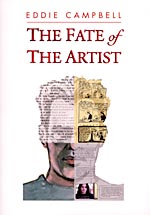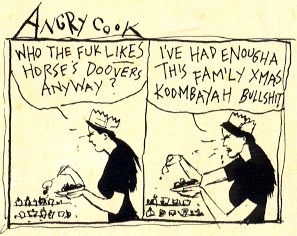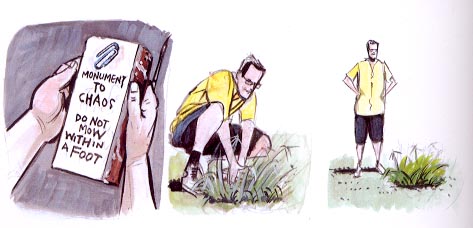 By Eddie Campbell
By Eddie Campbell
96 pages, color
Published by First Second Books
Eddie Campbell is probably best known in comics as the artist for From Hell (written by Alan Moore), or as the creator of his ten-volume Bacchus series. His most personal creations, though, are his autobiographical Alec graphic novels that show Campbell’s life in an unflinching and honest manner. The Fate of the Artist, then, is an almost metafictional response to Alec. Detailing Campbell’s disappearance, this strange documentary journey into Campbell’s life is truly like nothing else in comics to date.
It’s actually a little hard to really describe The Fate of the Artist because of its strange format. I’m not talking about its occasional shifts back and forth between prose (with spot illustrations), comic pages, and clippings of newspaper comic strips, but rather the story itself. It’s about Campbell’s life, and writer’s block, and relationships, but there’s much more about this. In some ways, you can best sum up The Fate of the Artist by pointing out that according to the book, it’s actually an actor playing the role of Eddie Campbell instead of Campbell actually drawing himself. And once you’ve gotten your head around that strange idea, everything else really falls into place.
 I’m not entirely sure that many other creators could have pulled off a book like The Fate of the Artist. Maybe it’s because through Alec Campbell has lived so much of his life in the public eye that he had already mastered the autobiographical format enough to turn everything on its head. Directors jump into the middle of a conflict between Campbell and his wife to make sure she looks “frenzied” enough, for instance, before the rest of the scene plays out according to Campbell’s recollections. Add in the yellowed newspaper clippings of mythical newspaper strips, occasional fumetti (photograph-based) interviews with his daughter Hayley, and imaginary friends drawn in crayon, and you’re beginning to get the idea of the carefully orchestrated madness laid out on the page for the reader to experience. In some ways it feels almost like a slow, deliberate retelling of a nervous breakdown, edited to try and bring clarity to something where it doesn’t exist and forcing Campbell to instead let the events unfold in this new, different manner. In some ways Campbell is adding a new level of privacy between himself and the reader by using all of these different narrative devices, but the reality is that he’s letting people closer in than ever before.
I’m not entirely sure that many other creators could have pulled off a book like The Fate of the Artist. Maybe it’s because through Alec Campbell has lived so much of his life in the public eye that he had already mastered the autobiographical format enough to turn everything on its head. Directors jump into the middle of a conflict between Campbell and his wife to make sure she looks “frenzied” enough, for instance, before the rest of the scene plays out according to Campbell’s recollections. Add in the yellowed newspaper clippings of mythical newspaper strips, occasional fumetti (photograph-based) interviews with his daughter Hayley, and imaginary friends drawn in crayon, and you’re beginning to get the idea of the carefully orchestrated madness laid out on the page for the reader to experience. In some ways it feels almost like a slow, deliberate retelling of a nervous breakdown, edited to try and bring clarity to something where it doesn’t exist and forcing Campbell to instead let the events unfold in this new, different manner. In some ways Campbell is adding a new level of privacy between himself and the reader by using all of these different narrative devices, but the reality is that he’s letting people closer in than ever before.
 The art in The Fate of the Artist is just as varied in form as the storytelling devices being used here, but they’re all just as effective. At a glance, my immediate thought had been how glad I was that part of the book was fully painted by Campbell. His art is at its most beautiful here, with small panels and their soft, faded colors that prove to be so expressive. The more I read of The Fate of the Artist, though, the more the other styles on display really stood out. The rough ink drawings of the “Angry Cook” strips, for instance, are so perfectly able to channel across all of the perceived rage around the cooking, and the photographs of Hayley Campbell not only ground the book in its own conceit of being an investigation into Campbell’s disappearance but provide an extra level of reality to the happenings, reminding you that Campbell and his family are all actual people. In the end it’s hard to even try to separate the writing and the art of The Fate of the Artist into their own entities, the two working so perfectly as a single unit.
The art in The Fate of the Artist is just as varied in form as the storytelling devices being used here, but they’re all just as effective. At a glance, my immediate thought had been how glad I was that part of the book was fully painted by Campbell. His art is at its most beautiful here, with small panels and their soft, faded colors that prove to be so expressive. The more I read of The Fate of the Artist, though, the more the other styles on display really stood out. The rough ink drawings of the “Angry Cook” strips, for instance, are so perfectly able to channel across all of the perceived rage around the cooking, and the photographs of Hayley Campbell not only ground the book in its own conceit of being an investigation into Campbell’s disappearance but provide an extra level of reality to the happenings, reminding you that Campbell and his family are all actual people. In the end it’s hard to even try to separate the writing and the art of The Fate of the Artist into their own entities, the two working so perfectly as a single unit.
With Campbell’s off-beat humor and sensibilities on display here, The Fate of the Artist charms and seduces the reader even as it attempts to confuse and obfuscate. Even the most straight-forward autobiography has the possibility of losing its audience under the question, “Why should we care?” With The Fate of the Artist, the only real question is how someone could not care about Campbell’s story by the time they’ve finished the book. Campbell’s ode to (among many other things) creative suicide is the most inventive and appealing book I’ve read in a long while, and it’s one that truly holds up to repeated re-readings. The title of “modern classic” is generally a pretentious or arrogant one to assign, but in the case of The Fate of the Artist I may have to make an exception to my feelings on the matter. Well done, well done indeed.
Purchase Links:
